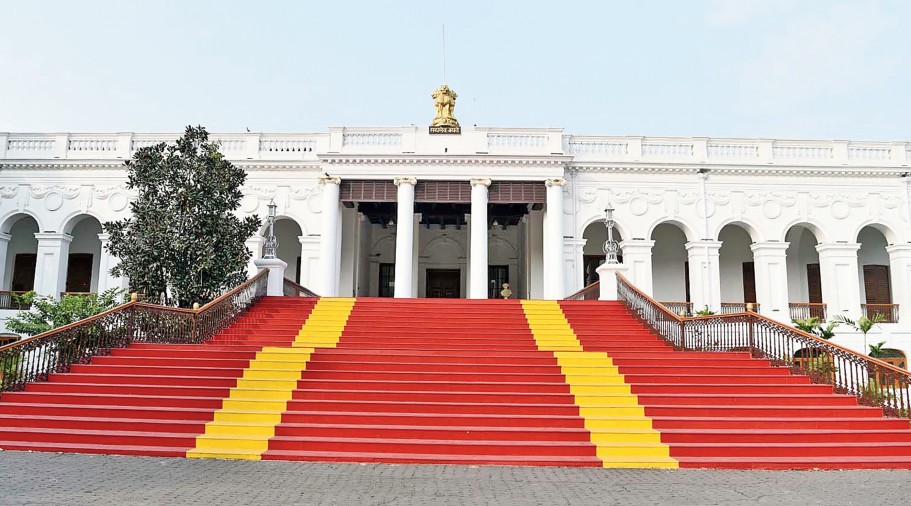At 8 o’clock on a pre-Covid Sunday morning, I walked into the National Library in Alipore in Calcutta. The reading room of the 180-year-old building was open to members although it was a holiday. I walked in, determined to plunge straight into the pages of the books I had left on the rack the day before. Tip tap tip tap... I walked at a leisurely pace, enjoying the sound of my three-inch heels on the wooden floor. Once or twice I thought someone was walking right behind me. But when I turned back, there was no one. As I stood in the middle of the room clutching on to my ration — three books — the emptiness of the place seemed formidable. I thought I heard the flutter of wings. Was it a pigeon, I wondered. It was February, but I remember feeling a chill. An odd thought floated into my head — it was Mir Jaffar who had gifted the 400-bigha Belvedere Estate to Warren Hastings for his support in reinstating him to the musnud of Murshidabad. I pulled my shawl closer and started to read.
I walked into the same Belvedere House exactly 20 years later. The hall that used to be the reading room had been turned into an exquisite exhibition space. The old-world bulbs were gone and now chandeliers poured light from above. As I strode on, I waited for the wood to sing out and upon hearing nothing, I looked down and saw the hollow wooden flooring had been replaced with fine tiles. In the background, a recorded voice narrated the heroic exploits of Syama Prasad Mookerjee. Bankimchandra Chattopadhyay, Tagore and Subhas Chandra Bose smiled down from the walls.
The change was too much to process at once. My mind kept throwing up images of the reading room from the past. The old room had books everywhere — on the desk of the librarian, inside the countless cupboards, on the racks... There used to be a long teak table in the centre of the room. Hovering over it were orange lights hanging from thick iron chains that were fixed to the high ceiling. The ceiling was hardly ever visible in the dark, but if you tilted your head and looked up, you could spot the racks laden with books on the first floor of the reading room. Ancient fans slap-banged the air inside the room with their olden blades.
On any given day, the reading room would have a dozen members. If I close my eyes, even today I can still see myself in one of the wooden chairs poring over Absalom and Achitophel. My friend is sitting right next to me but I can’t see her in the dim light. I can only hear her pen dragging across paper. Khash, khash, khash. Across the tabIe I can spy two hands arranging and rearranging a bunch of papers. Cluck, cluck, cluck, the hands punch together the pages.
Each and every sound, from the turning of pages to the squeak of a chair, would be magnified in this room, making you doubly aware of its vastness. And if someone happened to drop a book, the thump would send the birds in the hidden nooks and corners hither thither, as if rudely awakened from their midday dream.
I cannot remember any two people exchanging any two words in this space. And if anyone perchance did, a library staff would appear out of nowhere and bang onto the table a wooden signage which had inscribed on it a single word — SILENCE. Even the clerk who handled the requisitions was inimical to the spoken word. Always dressed in a white shirt and trousers, wearing thick glasses, he would respond to every query and request with a movement of his brows or hand or narrowing of eyes. A light shone right above his bald head and for some reason he gave me the shivers.
The reading room had a spirit of its own. And that spirit was conducive to thought, deep thought. When it magnified innocuous sounds, it actually turned the focus on the ordinary. This was where I could listen away to the monotonous cooing of the cuckoo bird and not be bored. I would watch my mind wander aimlessly, turn to the duel between Hastings and his legal officer Philip Francis on these very grounds — some say it had to do with the Baroness Inhoff. I would watch mesmerised as complete strangers drowned in the written word.
But the wealth of that scope is lost now. In its place stands a slick space, awash with lights and new markers of heritage. As I took my leave that day, I saw a pigeon change perch. Only, I missed the flutter.











